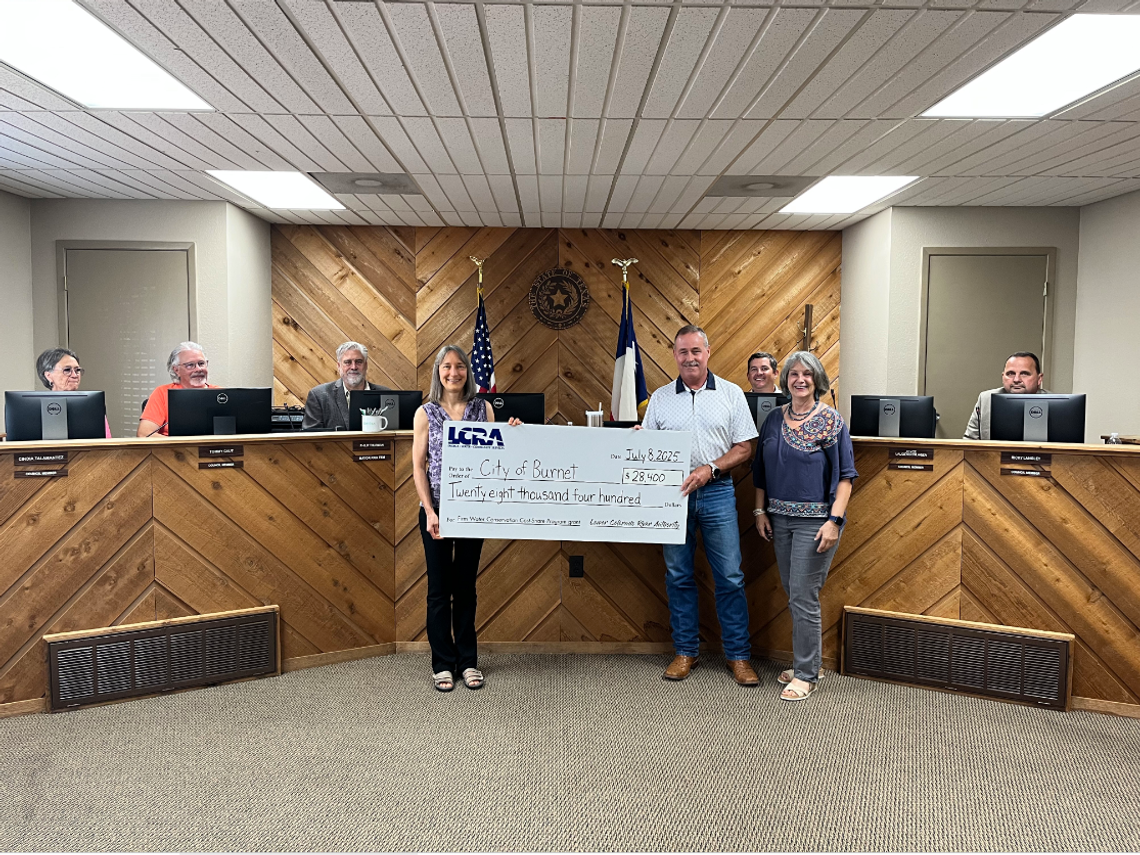With the help of a $28,400 grant from the Lower Colorado River Authority (LCRA), the City of Burnet will make high-tech improvements to its water metering infrastructure that will reduce water waste and save customers money. The grant, provided through LCRA’s Firm Water Conservation Cost-Share program, will help the city begin installing new cellular water meters as part of an Advanced Metering Infrastructure system. The system will include an online portal where customers can track their water use in real time, helping them spot potential leaks quickly, increase conservation and avoid costly bills. Burnet City Engineer Eric Belaj said testing has shown that roughly 17% of the existing meters fail to accurately read water usage. In addition, meter readings are collected only once a month, so residential and business customers sometimes discover leaks only when their monthly bills arrive. “One of the challenges we face right now is that many of our existing meters aren’t sensitive enough to detect small flows, such as slowdrip leaks,” Belaj said. “The new meters we’re installing will fix that problem.”
The LCRA grant will help the city carry out the initial, $232,800 phase of a four-phase project expected to be completed in two to three years. In the first phase, about 30% of the utility’s meters will be replaced or reprogrammed to function in the new AMI system. The new system will enable the utility to pinpoint leaks and share alerts with customers, better analyze water use trends and share water conservation tips. The first phase of the project is expected to save about 7 acre-feet – or about 2.3 million gallons – of water annually. The city estimates it will save about $32,000 a year with the new system. “This upgrade isn’t just about finding and fixing leaks – it’s also about empowering our community to better monitor and manage water use, especially in regard to irrigation and compliance with drought contingency plans,” Belaj said. “We are grateful that LCRA has been and continues to be a great partner in water conservation.” John Hofmann, LCRA executive vice president of Water, said LCRA supports the City of Burnet’s efforts to reduce water loss and conserve water from the Highland Lakes. “By adopting this new metering technology, the City of Burnet will increase water conservation, benefit its water utility customers and save the city money,” Hofmann said. “We are proud to help with this project to incorporate technology to pinpoint leaks, allowing the city and its customers to respond more quickly and reduce water waste.” The cost-share grants are awarded through LCRA’s Firm Water Conservation Cost-Share Program, which provides funding for water efficiency projects and programs established by LCRA’s firm water customers, including cities, utilities, industries and irrigation and recreational water users. Eligible projects must help reduce or maximize the efficient use of surface water, including water loss reduction efforts, equipment efficiency upgrades, conversion of irrigated areas from raw or potable water use to recycled water, and emerging technology projects focused on education, outreach or technology advancements. Learn more at www.WaterSmart. org. LCRA also offers residential rebates to help offset the cost of upgrading irrigation systems, maintaining landscapes and pools, converting turf to drought-tolerant landscapes, and soil testing. See www.WaterSmart. org/rebates for more information.
About LCRA The Lower Colorado River Authority serves customers and communities throughout Texas by managing the lower Colorado River; generating and transmitting electric power; providing a clean, reliable water supply; and offering outdoor adventures at more than 40 parks along the Colorado River from the Texas Hill Country to the Gulf Coast. LCRA and its employees are committed to fulfilling our mission to enhance the quality of life of the Texans we serve through water stewardship, energy and community service. LCRA was created by the Texas Legislature in 1934 and receives no state appropriations. For more information, visit www.lcra.org.













